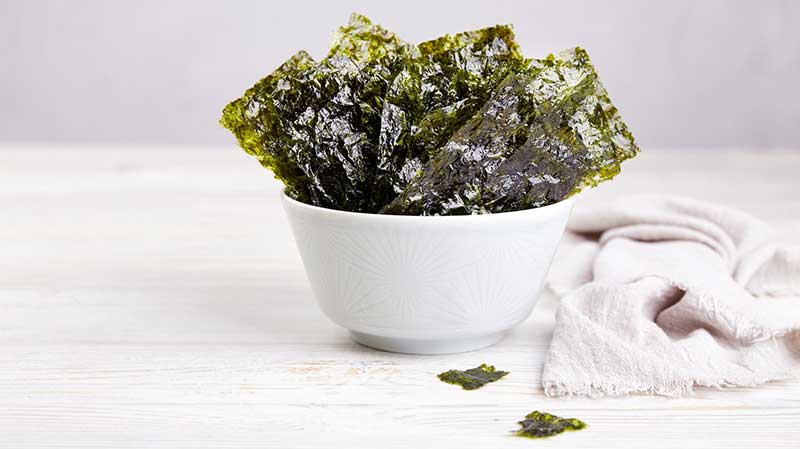Seaweed’s Nutrient Profile: Vitamins & Minerals
Welcome to our article on the nutrient profile of seaweed and its incredible health benefits. Seaweed, also known as sea vegetables, is a diverse group of marine plants that offer a wealth of essential vitamins and minerals. Incorporating seaweed into your diet can provide numerous advantages for your overall well-being.
Seaweed is packed with a plethora of vitamins and minerals that are vital for our body’s optimal functioning. It contains an impressive array of vitamins, including vitamin A, vitamin C, vitamin K, and several B vitamins. These vitamins play key roles in supporting various bodily processes and promoting good health.
Additionally, seaweed is an excellent source of minerals such as iodine, calcium, iron, magnesium, and potassium. These minerals are essential for maintaining proper nerve function, strong bones, a healthy immune system, and a well-balanced electrolyte system.
The importance of seaweed in our diet cannot be overstated. Its nutrient content makes it a fantastic addition to any meal plan. From promoting heart health and boosting the immune system to supporting thyroid function and offering anti-inflammatory properties, seaweed truly is a nutritional powerhouse.
So let’s dive deeper into the health benefits of seaweed, explore its rich nutrient content, and discover the types of vitamins and minerals it contains. Let’s unlock the secrets of this incredible oceanic treasure!
Key Takeaways:
- Seaweed is a marine plant that is loaded with essential vitamins and minerals.
- It contains vitamins such as vitamin A, vitamin C, vitamin K, and various B vitamins.
- Seaweed is also rich in minerals like iodine, calcium, iron, magnesium, and potassium.
- Incorporating seaweed into your diet can promote heart health, support the immune system, and provide anti-inflammatory benefits.
- Adding seaweed to your meals is a great way to boost your nutrient intake and enhance your overall well-being.
Health Benefits of Seaweed
Seaweed is not only a versatile ingredient but also packed with numerous health benefits. Including seaweed in your diet can contribute to improved overall health and wellbeing. Let’s dive into the various benefits of consuming this incredible ocean superfood.
Nutrient-Rich Powerhouse
Seaweed is a nutritional powerhouse, rich in vitamins and minerals essential for optimal health. It is an excellent source of:
| Vitamins | Minerals |
|---|---|
| Vitamin A | Iodine |
| Vitamin C | Magnesium |
| Vitamin K | Potassium |
| B vitamins | Calcium |
Boosts Immune System
Seaweed contains high levels of antioxidants, such as vitamin C and beta-carotene, which help strengthen the immune system. These antioxidants play a crucial role in neutralizing harmful free radicals and protecting cells from oxidative damage.
Promotes Healthy Thyroid Function
Iodine is an essential mineral for thyroid health, and seaweed is a fantastic natural source of iodine. Consuming seaweed can support thyroid function, which is responsible for regulating metabolism, growth, and development.
Supports Heart Health
The fiber content in seaweed can help reduce cholesterol levels, thereby promoting heart health. Additionally, the combination of minerals such as magnesium and potassium in seaweed helps maintain healthy blood pressure levels and supports cardiovascular function.
Enhances Gut Health
Seaweed is rich in dietary fiber, which is beneficial for digestion and maintaining a healthy gut. The fiber acts as a prebiotic, promoting the growth of beneficial gut bacteria, and improving overall digestive health.
Did you know? Seaweed is a staple in many traditional Asian diets, and these populations have been reaping its health benefits for centuries.
Anti-Inflammatory Properties
Seaweed contains various bioactive compounds with anti-inflammatory properties, such as fucoidans and phycocyanins. These compounds help reduce inflammation in the body, which can contribute to improved joint health and reduced risk of chronic diseases.
Weight Management
Seaweed is low in calories and fat while being rich in nutrients and fiber. Including seaweed in your diet can help promote satiety, control cravings, and support healthy weight management goals.
Bone Health
Seaweed contains calcium, magnesium, and vitamin K, which are all essential nutrients for maintaining healthy bones. Consuming seaweed regularly can help improve bone mineral density and reduce the risk of osteoporosis.
Environmental Sustainability
Alongside its health benefits, consuming seaweed also offers environmental advantages. Seaweed cultivation requires no freshwater, fertilizer, or land, making it a highly sustainable source of nutrition.
Incorporating seaweed into your diet can provide a wide array of health advantages. From boosting the immune system to supporting heart health and promoting gut health, the benefits of consuming seaweed are plentiful. So why not explore the wonders of this nutrient-rich ocean treasure and reap the rewards it has to offer?
Seaweed Nutrition Facts
Seaweed is not only renowned for its unique taste and versatility in culinary creations, but it also boasts an impressive nutrient profile. Rich in both macronutrients and micronutrients, seaweed offers a range of health benefits. Let’s dive deeper into the nutrition facts of seaweed and explore the essential vitamins and minerals found in different types.
Vitamins in Seaweed
Seaweed is a powerhouse of vitamins, providing an array of essential nutrients that support overall health and well-being. Here are some key vitamins commonly found in seaweed:
- Vitamin A: Known for its role in promoting healthy vision and cellular growth.
- Vitamin C: An antioxidant that aids in collagen production and immune system function.
- Vitamin E: Supports skin health and has antioxidant properties.
- Vitamin K: Important for blood clotting and bone health.
- Vitamin B12: Essential for red blood cell production and nervous system function.
Minerals in Seaweed
Seaweed is a treasure trove of minerals, offering an abundance of vital elements for various bodily functions. Here are some minerals commonly found in seaweed:
- Iodine: Important for healthy thyroid function and metabolism.
- Calcium: Crucial for bone health and muscle contraction.
- Iron: Essential for oxygen transport in the body and energy production.
- Magnesium: Plays a role in nerve function, muscle relaxation, and energy metabolism.
- Zinc: Supports immune function and cellular growth.
These are just a few examples of the vitamins and minerals that seaweed offers. The nutrient content may vary depending on the specific type of seaweed. Incorporating seaweed into your diet can provide a natural and nutrient-dense boost to support your overall nutrition.
| Seaweed Variety | Vitamin Content | Mineral Content |
|---|---|---|
| Nori | Vitamin A, Vitamin C | Iodine, Iron |
| Kombu | Vitamin K, Vitamin B12 | Calcium, Magnesium |
| Wakame | Vitamin E, Vitamin B6 | Zinc, Calcium, Magnesium |
By incorporating various types of seaweed into your meals, you can enjoy a diverse and nutritious range of vitamins and minerals that contribute to your overall well-being.

Types of Vitamins in Seaweed
Seaweed is not only a rich source of minerals but also contains a wide variety of essential vitamins. These vitamins play a crucial role in maintaining overall health and supporting various bodily functions. Let’s explore the different types of vitamins found in seaweed and their contributions:
Vitamin A
Seaweed is abundant in vitamin A, specifically in the form of beta-carotene. Beta-carotene is a powerful antioxidant that helps protect the body against oxidative stress and supports healthy vision.
Vitamin C
Another vitamin found in seaweed is vitamin C, known for its immune-boosting properties. Vitamin C also aids in collagen synthesis, promoting healthy skin and wound healing.
Vitamin E
Seaweed contains vitamin E, which acts as an antioxidant, protecting cells from damage caused by free radicals. Vitamin E also supports immune function and helps maintain healthy skin.
Vitamin K
Seaweed is a good source of vitamin K, which is essential for blood clotting and bone health. Adequate vitamin K intake helps ensure proper blood coagulation and optimal bone density.
B Vitamins
Seaweed encompasses various B vitamins, including folate, niacin, riboflavin, thiamine, and vitamin B6. B vitamins are important for energy production, proper brain function, and maintaining healthy hair, skin, and nails.
Vitamin D
While vitamin D is mostly obtained from sunlight exposure, some types of seaweed can contain small amounts of this essential vitamin. Vitamin D is crucial for calcium absorption, supporting bone health and immune function.
Incorporating seaweed into your diet can provide a natural and nutritious way to obtain these vital vitamins. By including seaweed in your meals, you can harness its nutritional benefits and support your overall health and well-being.
| Vitamin | Function |
|---|---|
| Vitamin A | Antioxidant, supports vision |
| Vitamin C | Immune support, collagen synthesis |
| Vitamin E | Antioxidant, immune support |
| Vitamin K | Blood clotting, bone health |
| B Vitamins | Energy production, brain function, hair, skin, and nails health |
| Vitamin D | Calcium absorption, bone health, immune support |
Minerals Found in Seaweed
Seaweed is not only a rich source of vitamins but also contains a plethora of essential minerals that are vital for our overall health and well-being. Let’s explore some of the minerals found in seaweed and their significance in supporting various bodily functions.
Iodine
One of the most important minerals found in seaweed is iodine. Iodine plays a crucial role in regulating thyroid function and maintaining a healthy metabolism. It is essential for the production of thyroid hormones, which are responsible for controlling growth, development, and energy expenditure in the body.
Calcium
Seaweed is also a good source of calcium, which is essential for maintaining strong bones and teeth. Calcium is involved in muscle contractions, blood clotting, and nerve function. Including seaweed in your diet can help you meet your daily calcium requirements naturally.
Magnesium
Magnesium is another mineral abundantly present in seaweed. It plays a vital role in over 300 enzymatic reactions in the body, including energy production, muscle and nerve function, and blood pressure regulation. Incorporating seaweed into your meals can contribute to your daily magnesium intake.
Iron
Seaweed is a good plant-based source of iron. Iron is necessary for the production of hemoglobin, which carries oxygen to all body tissues. Adequate iron intake is crucial for preventing iron deficiency anemia and maintaining optimal energy levels.
Zinc
Zinc is an essential mineral found in seaweed that supports immune function, wound healing, and DNA synthesis. It also plays a crucial role in maintaining healthy skin, hair, and nails. Including seaweed in your diet can help ensure adequate zinc intake.
These are just a few examples of the minerals found in seaweed. The exact mineral composition can vary depending on the type of seaweed. Incorporating seaweed into your diet can be a fantastic way to enhance your nutrient intake and reap the numerous health benefits it offers.
| Mineral | Function |
|---|---|
| Iodine | Regulates thyroid function and metabolism |
| Calcium | Maintains strong bones and teeth |
| Magnesium | Supports muscle and nerve function |
| Iron | Essential for oxygen transport and energy production |
| Zinc | Supports immune function and healthy skin |
Conclusion
In conclusion, seaweed is a highly nutritious food that offers a wide range of health benefits. Its nutrient profile is packed with vitamins and minerals, making it a valuable addition to any diet. By including seaweed in your meals, you can ensure that your body receives essential nutrients to support overall health and wellbeing.
Seaweed provides a rich source of vitamins, such as vitamin A, vitamin C, and folate, which contribute to immune function, collagen synthesis, and cellular growth. Additionally, it contains an array of minerals, including iodine, calcium, and iron, which are crucial for maintaining healthy bones, thyroid function, and oxygen transport in the body.
To reap the benefits of seaweed’s nutrient content, consider incorporating it into your regular meal plans. Whether enjoyed in sushi, salads, or soups, seaweed can add a unique flavor and texture to your dishes while providing a significant nutritional boost. So why not explore the culinary possibilities of seaweed and experience the positive impact it can have on your health?
FAQ
What vitamins and minerals are found in seaweed?
Seaweed is a nutritional powerhouse, packed with various vitamins and minerals. Some common vitamins found in seaweed include vitamin A, vitamin C, vitamin E, and several B vitamins. As for minerals, seaweed is a rich source of iodine, calcium, iron, magnesium, and potassium, among others.
What are the health benefits of consuming seaweed?
Consuming seaweed has numerous health benefits. The vitamins and minerals in seaweed support a strong immune system, promote healthy digestion, enhance thyroid function, and contribute to healthy skin and hair. Seaweed also contains antioxidants, which help protect cells against damage from free radicals.
What are some seaweed nutrition facts?
Seaweed is incredibly nutrient-dense. It is low in calories and rich in essential nutrients. For example, 100 grams of seaweed can provide significant amounts of vitamins A, C, E, and K. It also contains a range of minerals, including iodine, calcium, iron, and potassium. Additionally, seaweed is a great source of fiber.
What types of vitamins can be found in seaweed?
Seaweed contains a variety of vitamins. It is particularly rich in vitamin A, which supports healthy vision and immune function. It also contains vitamin C, an antioxidant that boosts the immune system and promotes collagen production. Other vitamins commonly found in seaweed include vitamin E, which has antioxidant properties, and various B vitamins that contribute to energy metabolism.
What minerals are present in seaweed?
Seaweed contains a wide array of minerals. It is especially notable for its high iodine content, which is essential for proper thyroid function. Seaweed also provides calcium, which is crucial for strong bones and teeth, and iron, which is necessary for the production of red blood cells. Additionally, seaweed is a good source of magnesium, potassium, and other important minerals.








